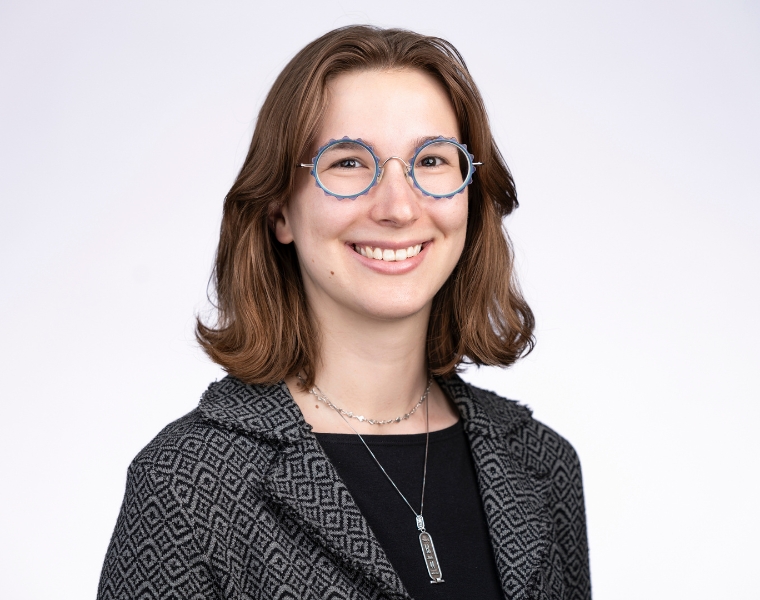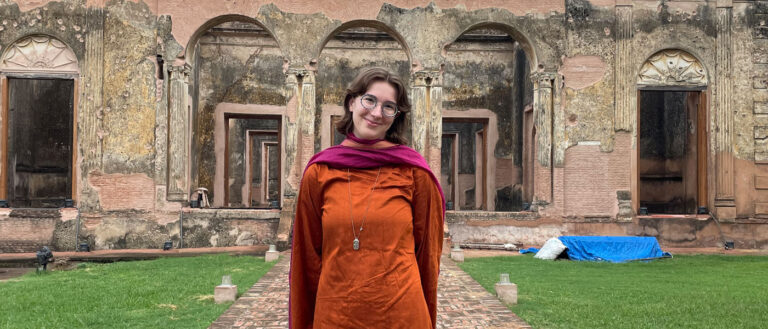This summer, Margaux Johnstone found herself reciting poetry in Urdu to a rickshaw driver while in Lucknow, India. It was the ultimate test of her abilities with the language—an experience afforded to her through the Critical Language Scholarship (CLS) program.
The program offers undergraduate and graduate students across the United States with opportunities to broaden their critical language skills while building relationships.

Johnstone, now a fourth-year student majoring in anthropology and international studies at Case Western Reserve University, set her sights on the program. Participating in this program also gave Johnstone an opportunity to learn more about global health dynamics in South Asia while pursuing a Master of Arts in Bioethics and Medical Humanities degree, which she expects to earn in spring 2025.
“I figured Urdu was the best South Asian language for me to start out with,” said Johnstone, who had a basic understanding of Arabic prior to starting the program. “My Urdu was not good enough to explain the details of my global health interest, so I resorted to telling strangers that I was learning Urdu because I liked the famous poets of Lucknow.”
To improve her Urdu skills, she immersed herself with the language by interacting with the host family she lived with.
“I went from [knowing] zero Urdu to bargaining with rickshaw drivers and discussing immigration policy in two months,” she said.
As a CWRU student, Johnstone also serves as a research assistant for MetroHealth’s Center for Biomedical Ethics and a resident assistant for upperclass housing on campus.
Read on to learn more about Johnstone’s time abroad and her experience in the CLS program.
Answers have been edited for clarity and length.
1. What inspired you to focus on global health dynamics in South Asia? How did learning Urdu enhance your understanding of the region?
As a medical anthropology and international studies major, global health is at the intersection of my interests. The challenges of the global polio eradication campaign in South Asia was a case study in one of my global health classes for the challenges of multilingual and cross-cultural health interventions. Urdu and English-speaking collaborators have a tendency to be on different pages—I wanted to learn Urdu to better understand the dynamics at play.
2. Can you describe your experience studying abroad in Lucknow?
Lucknow is a city that has blended its heritage and modernity—the Nawab architecture is marvelous and the subway is spotless. Being abroad is an invaluable experience that taught me about my personal and linguistic strengths.
I loved living with a host family—how much I understood at family dinners was my personal measure of how much I was improving. To celebrate [Eid al-Fitr], my host family and I left the city to visit their family in the village. My host siblings and cousins and I picked mangoes, feeding the unripe ones to goats and eating the rest ourselves.
3. Are there any memorable moments from your time abroad that you’d like to share?
My most memorable experience was learning zardozi, a type of Persian metal embroidery. After learning zardozi, I was distracted by every elaborate garment I saw in the markets because I wanted to understand the construction of the decorations. Zardozi is very challenging and I have a lot of respect for the artists that can do it.
4. In what ways did staying with your host family contribute to your language learning and cultural immersion?
I never had the opportunity to solely dedicate myself to learning a language, so it was an immense privilege. Most people are juggling their daily lives while picking up a language informally. I learned so much because I had the opportunity to focus on Urdu 24/7. Learning the language, in turn, allowed me to participate in the community and culture!
5. Looking forward, what are your academic and professional aspirations? How has your experience with the CLS program influenced these goals?
After graduating, I plan to work in global health. Any country where I can use my language skills is a win.
CLS was a big confidence boost for me—the program showed me that I can become conversational and connect with people much faster than I ever dreamed. Now, I have the confidence to move anywhere in the world, learn the language, and connect with the community. That’s exactly what I plan to do after graduation!


